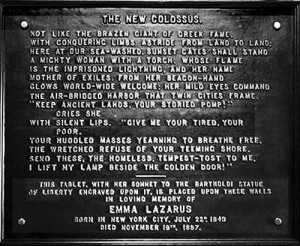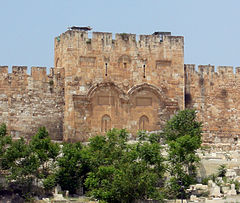The second reading I chose for the once-in-a-lifetime combination of Thanksgiving and Hanukkah dinner were two poems by Emma Lazarus.
were two poems by Emma Lazarus.
Most people know that her poem “The New Colossus”, which is printed at the foot of the statue of liberty. What is less known is that she was Jewish Sephardic and wrote most of her poems about Jewish themes.
If you want to learn more about the Jewish side of Emma Lazarus, I recommend this book by Esther Schor. She gave a fascinating talk at the Museum of Jewish Heritage in New York while it was hosting an Emma Lazarus exhibit.
First, lets read “The New Colossus”.

The New Colossus, By Emma Lazarus
Not like the brazen giant of Greek fame,
With conquering limbs astride from land to land;
Here at our sea-washed, sunset gates shall stand
A mighty woman with a torch, whose flame
Is the imprisoned lightning, and her name
Mother of Exiles. From her beacon-hand
Glows world-wide welcome; her mild eyes command
The air-bridged harbor that twin cities frame.
“Keep, ancient lands, your storied pomp!” cries she
With silent lips. “Give me your tired, your poor,
Your huddled masses yearning to breathe free,
The wretched refuse of your teeming shore.
Send these, the homeless, tempest-tost to me,
I lift my lamp beside the golden door!”
Next, lets read this poem which links the two events that coincided to bring her family to the United States:
Thou two-faced year, Mother of Change and Fate,
Didst weep when Spain cast forth with flaming sword,
The children of the prophets of the Lord,
Prince, priest, and people, spurned by zealot hate.
Hounded from sea to sea, from state to state,
The West refused them, and the East abhorred.
No anchorage the known world could afford,
Close-locked was every port, barred every gate.
Then smiling, thou unveil’dst, O two-faced year,
A virgin world where doors of sunset part,
Saying, “Ho, all who weary, enter here!
There falls each ancient barrier that the art
Of race or creed or rank devised, to rear
Grim bulwarked hatred between heart and heart!”
Obviously, the two events that occurred in 1492 were the expulsion of the Jews of Spain, and Columbus sailing to America. Here you can watch the former President of Israel, Itzhak Navon, browsing through the Edict of Expulsion and the Royal Sanction for the sailing of Columbus in the Crown Archives in Barcelona:
Comparing the two poems, you can see several beautiful linguistic parallels:
- Mother of Exiles <-> Mother of Change and Fate
- Give me your tired, your poor… <-> Ho, all who weary, enter here
- sunset gates shall stand <-> where doors of sunset part
- her mild eyes command <-> Then smiling, thou unveil’dst
There is also an interesting reference in the “golden door”. Emma Lazarus was an avid Bible reader and wrote a poem called The New Ezekiel. With that in mind, it is not unreasonable to interpret “golden door” as a reference to “golden gate”.
The Golden Gate, as it is called in Christian literature, is the oldest of the current gates in Jerusalem’s Old  City Walls. According to Jewish tradition, the Shekhinah (שכינה) (Divine Presence) used to appear through this gate, and will appear again when the Messiah comes (Ezekiel 44:1–3) and a new gate replaces the present one; that is why Jews used to pray for mercy at the former gate at this location. Hence the name Sha’ar HaRachamim (שער הרחמים), the Gate of Mercy.
City Walls. According to Jewish tradition, the Shekhinah (שכינה) (Divine Presence) used to appear through this gate, and will appear again when the Messiah comes (Ezekiel 44:1–3) and a new gate replaces the present one; that is why Jews used to pray for mercy at the former gate at this location. Hence the name Sha’ar HaRachamim (שער הרחמים), the Gate of Mercy.
You can find the complete poems of Emma Lazarus here.
You can also find online the Jewish Medieval poems and prose Emma Lazarus translated from Spanish including Yehuda Halevi and others here.
